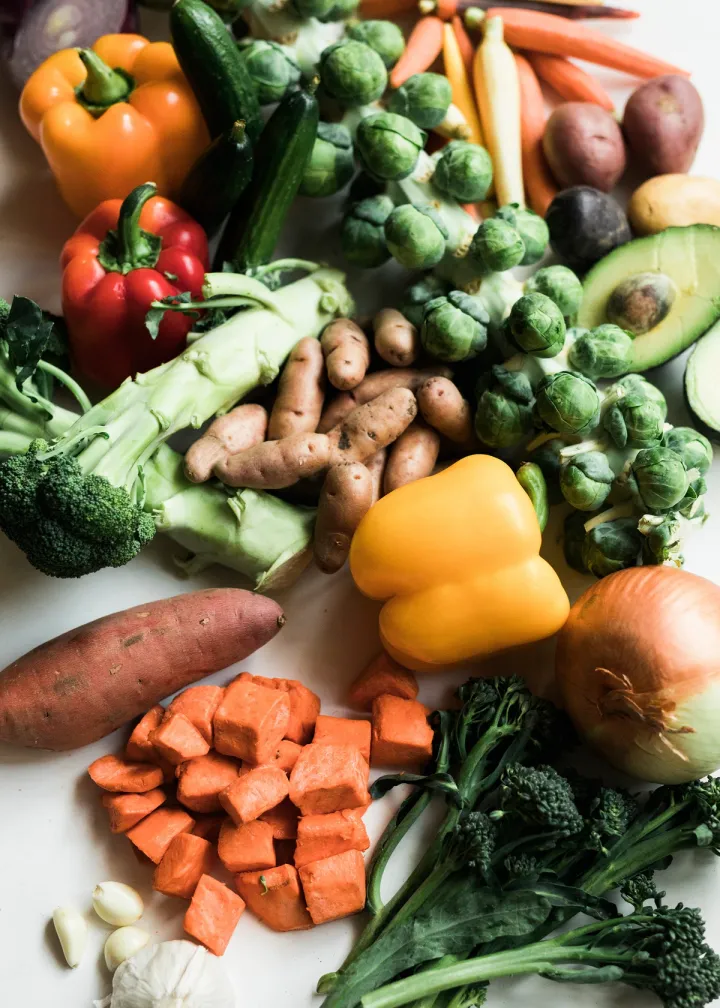
Is Being Vegetarian Bad for Your Health? I Asked a Dietitian
It might benefit the environment but does it benefit your health?
It seems like more and more of us are switching to vegetarian and vegan options when it comes to our diets. Whether it’s for health, ethical, religious, cultural, or environmental reasons, it’s hard to ignore restaurants increasingly catering for those who don’t eat meat and the rise of plant-based options in grocery stores.
I stopped eating red meat when I was 16 and subsequently turned to a pescatarian diet a couple of years later. I enjoy seafood but really only eat it if I’m at a nice restaurant. For me, this way of eating has nothing to do with my health. However, I'm now intrigued about whether a vegetarian diet is better for you than eating a standard meat and veg diet as I’ve definitely heard mixed opinions, but mostly non-professionals. You’re not alone if you’re confused as to how vegetarian diets stack up nutritionally since there’s lots of conflicting information out there.
To get to the bottom of this, I asked dietitian Chloe Mcleod to give me a rundown of the potential positives and negatives (from a health perspective) of being vegetarian and how you can ensure you are meeting your nutritional needs.
What is a vegetarian diet?
A vegetarian diet generally excludes all animal flesh, however, some individuals may still include eggs and/or dairy. A vegan diet, however, excludes all animal flesh, and products from animals and may even extend to cosmetics and clothing. With the growing popularity of vegan/vegetarian diets, there is also an increase in plant-based diets, where individuals still consume animal products in smaller amounts, with a focus on increasing plant-based or vegetarian choices.
What are the benefits of being vegetarian?
There is growing evidence of the benefits of consuming plant-based foods to support our gut health, mental health and reduce inflammation. This is because plant-based foods are rich in fibre, antioxidants and phytochemicals which are known to play an important role in optimising our health. A vegetarian diet, which is low in highly processed foods, is also naturally low in foods and nutrients which are known to have negative health outcomes when consumed in large amounts such as red meat and saturated fats. There are also sustainability and environmental benefits of following a vegetarian diet. In fact, the Eat Lancet report identified the best diet for both our health and the planet consists of mostly plant-based foods with small amounts of meat and dairy.
What are the negatives of following a vegetarian diet?
While there are numerous health and environmental benefits of following a vegetarian diet, it is not without its challenges. It can take additional planning and nutrition knowledge to ensure you are still meeting your requirements. This is because animal products such as meat, fish, eggs, and dairy are all important sources of key nutrients such as iron, vitamin B12, calcium, omega-3s, and more. Most of these nutrients can be consumed in adequate amounts on a plant-based diet, however, this requires careful planning, and depending on your level of restriction, you may require supplementation.
How can you ensure your vegetarian diet is healthy?
There are a few key considerations to ensure your vegetarian diet is supporting your health. Without proper planning, vegetarian diets tend to be low in protein and nutrients such as iron, zinc, vitamin B12, calcium, and omega-3s. Ensuring you include wholegrain carbohydrates, a variety of vegetables, and a vegetarian protein source with each of your meals is a great start. Additionally, if you do not consume dairy, it's important to choose non-diary alternatives which are calcium-fortified.
Some of our favourite vegetarian, high protein foods include: legumes, tofu, tempe, mycoprotein, nuts/seeds, as well as eggs and low-fat dairy products (if you consume them). While often under-consumed, legumes are a great way to increase your protein and iron intake on a vegetarian diet. We love them on their own, as hummus, roasted as a snack or in the form of pulse pasta. To increase your absorption of iron on a vegetarian diet, try pairing your vegetarian protein sources with some vitamin C such as a fresh tomato salsa, or drizzle of lemon juice!
When should you see a dietitian?
As with anything when it comes to your health, the diet you follow is completely individual. However, if you’re unsure if you’re meeting your nutrient requirements, considering supplementation, have low energy levels, or simply need some meal inspiration for balanced vegetarian meals, we recommend reaching out to a dietitian for some individualised support!
The takeaway
A vegetarian diet can be a healthy lifestyle choice when done properly. A well-balanced vegetarian diet can provide all the necessary nutrients for good health and support gut health, mental health, and reduce inflammation. But without proper planning, vegetarian diets tend to be low in protein and nutrients so these need to be front of mind.
Chloe McLeod is a dietitian and the director of Verde Nutrition Co. Follow her at @verdenutritionco and @chloe_mcleod_dietitian
This article is intended for informational purposes only and is not a substitute for individualised health advice. If you are concerned about your health and well-being, please speak to your GP, who will advise on the correct treatment plan. You can also call Lifeline 24/7 for mental health support on 13 11 14 and visit the Butterfly Foundation for eating disorder or body image issues.
Enjoyed This?
Discover more dietary articles.










